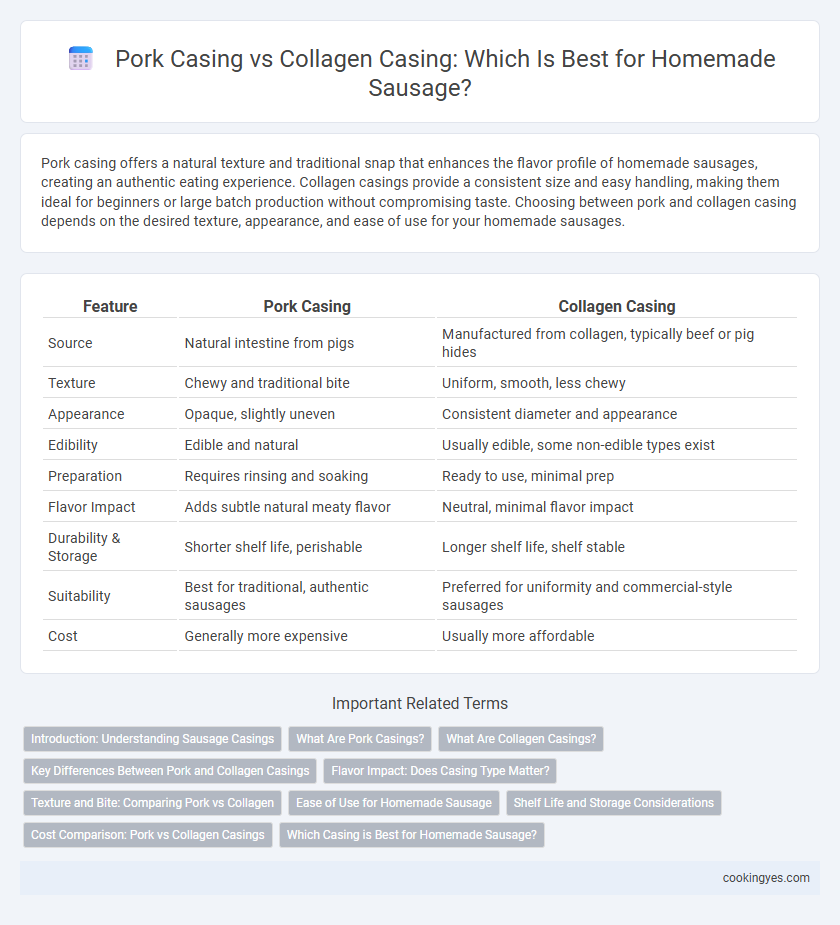Pork casing offers a natural texture and traditional snap that enhances the flavor profile of homemade sausages, creating an authentic eating experience. Collagen casings provide a consistent size and easy handling, making them ideal for beginners or large batch production without compromising taste. Choosing between pork and collagen casing depends on the desired texture, appearance, and ease of use for your homemade sausages.
Table of Comparison
| Feature | Pork Casing | Collagen Casing |
|---|---|---|
| Source | Natural intestine from pigs | Manufactured from collagen, typically beef or pig hides |
| Texture | Chewy and traditional bite | Uniform, smooth, less chewy |
| Appearance | Opaque, slightly uneven | Consistent diameter and appearance |
| Edibility | Edible and natural | Usually edible, some non-edible types exist |
| Preparation | Requires rinsing and soaking | Ready to use, minimal prep |
| Flavor Impact | Adds subtle natural meaty flavor | Neutral, minimal flavor impact |
| Durability & Storage | Shorter shelf life, perishable | Longer shelf life, shelf stable |
| Suitability | Best for traditional, authentic sausages | Preferred for uniformity and commercial-style sausages |
| Cost | Generally more expensive | Usually more affordable |
Introduction: Understanding Sausage Casings
Pork casings, derived from the intestines of pigs, offer a natural, tender texture and authentic flavor for homemade sausages, enhancing the eating experience with their permeability and elasticity. Collagen casings, made from processed animal collagen, provide uniform size and ease of use, making them ideal for beginners or those seeking consistent sausage shapes without the need for extensive preparation. Choosing between pork and collagen casings depends on desired texture, flavor, and preparation preferences in crafting high-quality homemade sausages.
What Are Pork Casings?
Pork casings are natural edible membranes made from the intestines of pigs, commonly used in traditional sausage making for their unique texture and ability to absorb flavors. These casings provide a natural snap and allow sausages to breathe during cooking, enhancing the final taste and bite compared to synthetic options. Ideal for authentic homemade sausages, pork casings maintain moisture and contribute to a classic sausage appearance and mouthfeel.
What Are Collagen Casings?
Collagen casings are made from processed collagen derived primarily from beef or pork hides, designed to mimic natural sausage casings while offering greater uniformity and ease of use. These casings provide a consistent diameter and are easier to handle for home sausage makers, making them ideal for various types of sausages including fresh, smoked, and cooked varieties. Collagen casings are edible, often dissolving partially during cooking, and are preferred for their versatility compared to traditional pork casings which require soaking and careful handling.
Key Differences Between Pork and Collagen Casings
Pork casings, derived from the small intestines of pigs, offer a natural, edible casing with a tender texture that enhances the authentic flavor of homemade sausages. Collagen casings are manufactured from processed collagen extracted mainly from beef or pig hides, providing consistent thickness, easier stuffing, and a quicker cooking time due to their uniformity. While pork casings require soaking and careful preparation, collagen casings are more convenient and are preferred for uniformity and ease of use in sausage making.
Flavor Impact: Does Casing Type Matter?
Pork casing imparts a natural, slightly smoky flavor that enhances the overall taste of homemade sausages, while collagen casing tends to be more neutral, allowing the sausage seasoning to shine without interference. The porous texture of pork casing also contributes to better smoke absorption and crispier skin, intensifying flavor complexity. Collagen casing offers consistent size and ease of use but may lack the authentic taste nuances preferred by traditional sausage enthusiasts.
Texture and Bite: Comparing Pork vs Collagen
Pork casing offers a natural, chewy texture with a satisfying snap that enhances the eating experience of homemade sausages. Collagen casing provides a consistent, tender bite but lacks the authentic chewiness found in natural pork casings. Texture preference largely depends on whether a traditional snap or a uniform, softer bite is desired in sausage making.
Ease of Use for Homemade Sausage
Pork casing offers a traditional texture and natural flavor but requires thorough cleaning and soaking, which can be time-consuming for homemade sausage. Collagen casing is pre-processed, making it easier to handle and faster to prepare, ideal for beginners or quick sausage production. Its uniform size and consistent cooking performance also simplify the stuffing and cooking process in home sausage-making.
Shelf Life and Storage Considerations
Pork casings offer a natural barrier that enhances the shelf life of homemade sausages by providing better moisture retention and breathability, reducing spoilage risks during refrigeration. Collagen casings, being synthetic, generally have a shorter shelf life once filled and require more careful storage, often necessitating immediate consumption or freezing to maintain quality. Proper refrigeration at temperatures below 40degF (4degC) is crucial for both casing types to extend freshness and prevent bacterial growth.
Cost Comparison: Pork vs Collagen Casings
Pork casings typically cost more than collagen casings due to their natural origin and traditional processing methods, often ranging between $0.30 to $0.50 per foot. Collagen casings, manufactured from processed collagen, generally cost about $0.10 to $0.25 per foot, making them a budget-friendly option for homemade sausage production. Choosing between pork and collagen casings depends on balancing cost considerations with texture and flavor preferences in sausage making.
Which Casing is Best for Homemade Sausage?
Pork casing, made from the small intestines of pigs, offers a natural, traditional texture and flavor that enhances homemade sausage authenticity and provides excellent breathability for even cooking. Collagen casing, derived from animal collagen, offers a uniform size, easier handling, and consistent thickness, making it ideal for beginners and quick preparation. For homemade sausage, choosing between pork and collagen casing depends on desired texture, cooking method, and personal preference, with pork casing favored for natural taste and collagen casing preferred for convenience.
Pork casing vs collagen casing for homemade sausage Infographic

 cookingyes.com
cookingyes.com